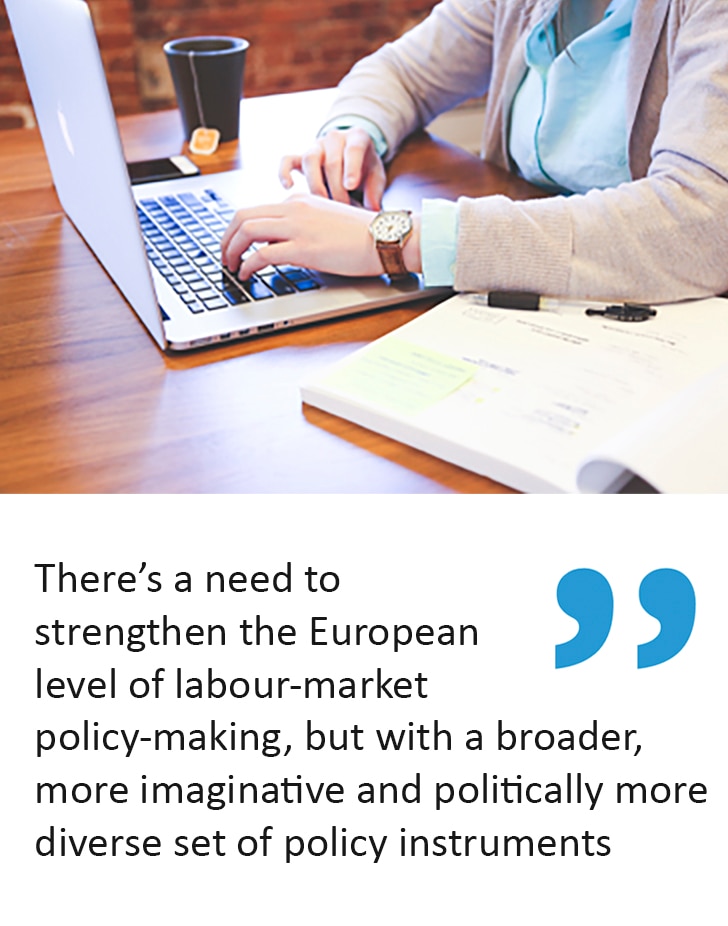Europe’s economic challenges
What is Europe’s economic outlook? How can it overcome the impact of the crisis and start to grow and create jobs again? In the book published by BBVA, The Search for Europe: Contrasting Approaches, twenty-three prestigious authors attempt to respond to these and other questions weighing on the most ambitious integration project in modern history. The book is available for free on the knowledge community, OpenMind.

In the section “The Economic Foundations of the European Project”, BBVA Global Executive Chairman Francisco González and the World Bank’s Indermit Gill and Martin Raiser; together with the IMF’s Naotaka Sugawara; renowned sociologist Colin Crouch; and the global research association, The Conference Board’s Bart Van Ark reflect on the economic challenges Europe must face.
“Europe, Between Stagnation and Technological Revolution: Digital Banking as a Driver of Economic Growth” by Francisco González

BBVA Global Executive Chairman Francisco González reviews the potential impact of the technological revolution on growth in the old continent. The puzzling macroeconomic climate – characterized by low growth, near-zero interest rates and very low inflation, increasingly strict regulation of banks and a technological change with unforeseeable consequences – create uncertainty that hinders growth in Europe.
After analyzing the most popular theories, Francisco González argues for the need to formulate an economic and social plan (fiscal, monetary and structural reform policies, including immigration). He concludes that the "digital" transformation of banking is another key structural reform to boost growth and well-being in Europe and around the world.
“Europe’s Growth Model in Crisis” by Indermit Gill, Martin Raiser and Naotaka Sugawara

Indermit Gill, Martin Raiser and Naotaka Sugawara attribute the crisis in Europe to a lack of real convergence, poor management of the Greek problem and European leaders’ failure to sever governments and banks. Analyzing the strengths and weaknesses of the European growth model (trade, enterprise, finance, money, labor and government), Gill, Raiser and Sugawara maintain that the countries in Europe that have come out well from the global economic and financial crisis are those that have harnessed the forces of economic integration most effectively, and have addressed weaknesses in the organization of work and welfare in particular.
However, they are optimistic about the effectiveness of the European growth model, insisting that Europe needs to improve, not discard its growth model.
“European Employment and Labour Market” by Colin Crouch

In his reflection on employment, Colin Crouch argues for a balance between social policies and market-making, in contrast to the current model of labor market deregulation. He insists on the importance of confronting new and old social risks through a combination of transfer payments and services. He defends the systems established in the Netherlands and Denmark and draws attention to the success of the Danish model of “flexicurity”.
This term refers to employment security replacing job security (security in a specific job). Crouch also addresses immigration and calls for greater cooperation among European countries to help immigrants join the labor market in recipient countries.
“Contrasts in Europe’s Investment and Productivity Performance” by Bart Van Ark

In his article, Bart Van Ark documents two economic challenges Europe needs to address. The first refers to the slower output, investment and productivity growth rate compared to the pre-crisis period. The second refers to the performance gap relative to the United States.
In his opinion, accelerating investment in the most important assets is essential to recovering productivity. Furthermore, he concurs with the Global Executive Chairman of BBVA regarding the need to encourage investment in new technologies and provide greater support for entrepreneurial initiatives. According to Van Ark, it is important to agree on a common European project to take advantage of the productivity gains from larger market size.